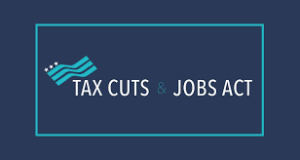
Many are wondering how the new tax laws will affect them in the short and long-term. Our Wealth Management unit dedicated the first Financial Literacy seminar of the year to the topic, with our managing director of Wealth Management, Dr. Peter Roland, providing an overview of what to expect and how best to prepare.
In addition to the overview we’ll present in this blog post, you may view the full webinar here. You may download the presentation to follow along, take notes, and note any questions.
The official name for the bill that passed in December 2017 is “An Act to provide for reconciliation pursuant to titles II and V of the concurrent resolution on the budget for fiscal year 2018.” Not very catchy, Congress has dubbed it the “Tax Cuts and Jobs Act.” No matter the name, what this bill was designed to do is lower general tax rates, while also making changes to the deductions and exemptions many have grown accustomed to. With that, this bill creates “winners,” “losers,” and considerations and opportunities for both short and long-term wealth management.
Changes in Tax Rates and Deductions/Exemptions
 With this new plan, individual tax rates have dropped, meaning many are seeing more money in their paychecks. At the same time, the standard deduction amounts have nearly doubled. However, this can lead to an issue at tax time for taxpayers with large itemized deductions and personal exemptions. Their tax liability may go up even though the rate at which they are being taxed is lower. To make sure you’re not headed for a surprise when your 2018 taxes are being prepared, do what we call a “Paycheck Check-up”. Use the withholding calculator provided by the IRS to make sure enough money is being withheld from your pay.
With this new plan, individual tax rates have dropped, meaning many are seeing more money in their paychecks. At the same time, the standard deduction amounts have nearly doubled. However, this can lead to an issue at tax time for taxpayers with large itemized deductions and personal exemptions. Their tax liability may go up even though the rate at which they are being taxed is lower. To make sure you’re not headed for a surprise when your 2018 taxes are being prepared, do what we call a “Paycheck Check-up”. Use the withholding calculator provided by the IRS to make sure enough money is being withheld from your pay.
Among the changes in itemized deductions in the Tax Cuts and Jobs Act:
- Medical expenses for 2018 and 2019 are now deductible in excess of 7.5% of adjusted gross income (AGI). Before it was in excess of 10% of your AGI.
- Deduction for State, Local, and Real Estate taxes (SALT) is limited to $10,000.
- Deduction for Mortgage Interest Qualified Acquisition Debt reduced from $1,000,000 to $750,000 for first or one second home.
- Home Equity Loans other than the amount used to acquire or improve the home are no longer deductible.
- Charitable contributions can now offset 60% of AGI (was 50%).
- Casualty losses eliminated except for federally-declared disaster areas.
- Miscellaneous Itemized Deductions eliminated (unreimbursed employee business expenses, investment fees, tax prep fees).
- Personal Exemptions have been eliminated (was $4,050 per Exemption in 2017).
- Higher exemptions for Alternative Minimum Tax.
- Alimony is not taxable by recipient (or deductible by payor) for new agreements after 12/31/2018.
- Homeowners gain exclusion ($250,000/$500,000) now requires that the homeowner must live in the residence five of the prior eight years as opposed to two of the prior five years.
This new law has also affected credits and deductions related to child care and college savings:
- Child Care Credit increased from $1,000 to $2,000.
- Section 529 Education Plans allowed to distribute up to $10,000 for elementary, secondary, and certain home school expenses.
- Investment income of child now taxed at higher trust tax rates vs. individual tax rates.
Estate & Gift Taxation as changed as follows:
- Federal exemption of estate tax is now $11.2 million per person (to be adjusted for inflation).
- Higher Annual Gift Tax exemption amount of $15,000 (raised from $14,000).
Business owners will see a reduction in tax rates as well:
- Regular “C” Corporation: highest tax rate reduced from 35% to 21%
- Higher Section 179 depreciation deduction limits
- New deductions for 20% of qualified business net income from passthrough entities (S Corporations, Partnerships, LLC’s, Sole Proprietorships).
- Income limits for 20% benefit – $157,500 and $315,000 taxpayer income.
- 20% deduction of income from REIT dividends, Master Limited Partnership dividends, and Co-ops.
- Real Estate now counts as a qualified business.
Truc Alert
 A “Truc” is not some advanced financial term. It’s the word our local Pennsylvania Dutch use for “trick.” Under this new tax law, even though for many the tax rate will go down, the amount of tax owed will increase. In addition:
A “Truc” is not some advanced financial term. It’s the word our local Pennsylvania Dutch use for “trick.” Under this new tax law, even though for many the tax rate will go down, the amount of tax owed will increase. In addition:
- These reduced tax rates and standard deduction changes for individuals will sunset, aka disappear, in 2025.
- Those beneficial provisions will be disappearing on a now-expanded income base.
- The new IRS inflation factor calculation for brackets modified are now using “Chained CPI,” resulting in higher taxes over time as a result of “taxflation.”
Strategies
 How can you make the best of the advantages and disadvantages of this new tax law? In addition to the “Paycheck Check-up” we recommended earlier, you might also consider:
How can you make the best of the advantages and disadvantages of this new tax law? In addition to the “Paycheck Check-up” we recommended earlier, you might also consider:
- Take advantage of “Tax Arbitrage” when possible.
- Use donor-advised funds to “bunch” charitable contributions, using appreciated assets when possible.
- Look at your “bucket list,” the funds you choose to be taxed now, taxed later, and never taxed (i.e., Roth IRA).
- Review Roth IRA opportunities
- Consider real estate investments to enjoy the 20% deduction of net income from investment real estate activity. This is especially key as many will opt to rent over buying a home with the loss of the itemized deduction benefit.
- Evaluate your personal debt and consider paying off non-deductible home equity loans more quickly that are no longer subject to interest deductibility.
- Plan for and use the 20% deduction against “Qualified Business Income” and evaluate your business structure for new rules.
- Make optimal use of “portability” election in estates to maximize the exemption available to surviving spouse, not forgetting about step up in tax basis for assets flowing through estates. Also consider State inheritance taxes in your planning.
We’ve included a lot of information in this blog post. Take about 45 minutes of your time, watch the webinar, and please let us know if we can help with any questions you might have regarding this or any other financial services matter. Contact us online or call 215-723-4881.



 With t
With t A “Truc” is not some advanced financial term. It’s the word our local Pennsylvania Dutch use for “trick.” Under this new tax law, even though for many the tax rate will go down, the amount of tax owed will increase. In addition:
A “Truc” is not some advanced financial term. It’s the word our local Pennsylvania Dutch use for “trick.” Under this new tax law, even though for many the tax rate will go down, the amount of tax owed will increase. In addition: How can you make the best of the advantages and disadvantages of this new tax law? In addition to the “Paycheck Check-up” we recommended earlier, you might also consider:
How can you make the best of the advantages and disadvantages of this new tax law? In addition to the “Paycheck Check-up” we recommended earlier, you might also consider:
